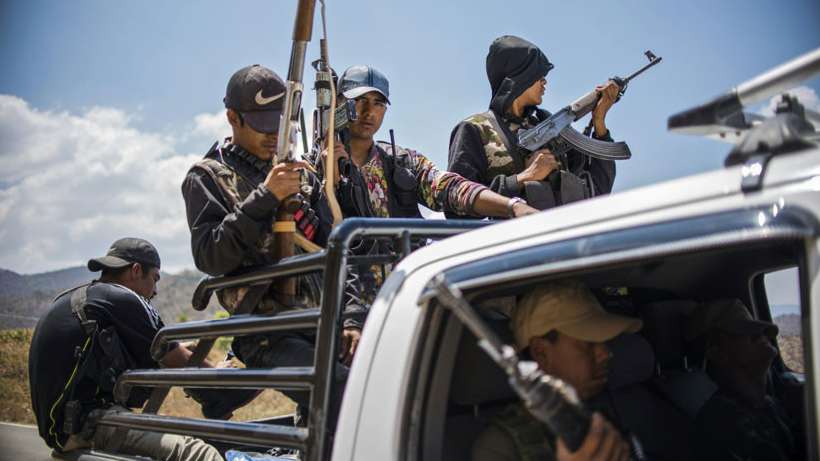Organized crime networks in Latin America, which converge between regional and extra-regional structures, are experiencing a historic economic boom. All indications are that 2024 was likely consolidated as the most lucrative year for illicit economies, with record figures recorded in the hemisphere.
With the advance of what we have called the Fourth Wave of Transnational Crime (TCO), organized crime has ceased to be a peripheral threat for most citizens. It has become a central actor, capable of representing an existential threat to the survival of representative democracy and the rule of law. The flood of illicit capital and corrupting practices in politics, both at the national and regional level, makes it urgent to understand these new phenomena and articulate responses within an institutional and democratic framework.
TOCs are characterized by operating with new markets, new actors, and unprecedented modalities. TOCs, including extra-regional actors, are boldly emerging. They behave as economically rational agents that respond to emerging opportunities and take advantage of the transformations in illicit economies in all their forms.
Evolution of the phenomenon
The first wave was represented by Pablo Escobar and the Medellín Cartel. They were the pioneers in moving tons of cocaine to the U.S. market through Caribbean routes.
Led by the Cali Cartel, the second wave perfected a more sophisticated scheme for shipping cocaine to the U.S. and diversified routes through Central America and Mexico. Up to this point, it was one product (cocaine) to one market (the U.S.).
The third wave, of the Bolivarian Revolution, is characterized by the criminalization of state structures that employed armed groups such as the FARC, using cocaine production and trafficking as instruments of state policy and functionally modifying certain public policies. At this point, the main product diversified (cocaine and gold) toward a main market (the U.S.), with expansion into Europe.
The current fourth wave is marked by the entry of extra-regional groups, such as the Italian Ndrangheta, Albanian mafias, or Turkish criminal networks. They drive the expansion of synthetic drugs and illicit gold exploitation. These organizations often operate under the protection of authoritarian governments, whether self-styled left or right, exchanging illicit market capital for political protection.
Territorial control
This Fourth Wave is not defined exclusively by violence, although it tends to register particularly bloody periods during disputes for strategic territorial control among local groups. However, its real threat lies in the ability of criminal organizations to establish logics of parallel governance, exercise territorial control, penetrate institutions, and substitute state functions.
This strategy, often facilitated by the complicity of political networks within the state itself, produces a double effect: it delegitimizes the state, by evidencing its inability to combat transnational crime, and grants legitimacy to criminal groups, which assume state functions—such as providing security, generating jobs, or dispensing rudimentary forms of justice—more efficiently than formal institutions. It is a form of power that operates from the margins but directly influences the political, economic, and social core of our countries.
These criminal actors redefine the rules of the game in territories. They capture state functions and corrupt democratic foundations until little remains of institutional infrastructure. It is a phenomenon that, following the virus analogy described by Pablo Zeballos, spreads unnoticed at first, until it kills the host body.
Transnational convergence
Evidence of the new convergence typical of the Fourth Wave abounds today. A clear example occurred in June 2025, when a court in Chile convicted two Chinese citizens, an Albanian, and a Peruvian for trafficking cocaine from Valparaíso to Rotterdam, Netherlands. A few days later, in a joint operation with Italian and British police, Colombian authorities arrested in Santa Fe de Bogotá Giuseppe Palermo, one of the bosses of the powerful Calabrian mafia, the ‘Ndrangheta.
These events constitute clear signs of the new and dangerous convergences of transnational organized crime in Latin America. Extra-regional actors have forged unprecedented alliances, building global superstructures in coordination with regional and national criminal groups that control territories and strategic infrastructures.
Another paradigmatic example occurred in March 2025. A team of prosecutors in Arica, Chile secured a court conviction against 34 members of the criminal gang Tren de Aragua for multiple acts of violence and homicide. This group, born in Venezuela and now operating regionally, represents a particularly dangerous phenomenon: a variant of TCO known as Risk Exo-Criminality (ECR).
Less democracy, more authoritarianism
The other side of the weakening of democratic states is the rise of ideologically agnostic authoritarianism. It stays in power using transnational organized crime groups as instruments of state policy. The most notable case was the alliance of the Bolivarian countries (Venezuela, Bolivia, Ecuador, Nicaragua, Cuba) with the FARC when the guerrilla group was the world’s largest cocaine producer.
Among the authoritarian states defined by such alliances today are Venezuela, Nicaragua, and El Salvador. Each follows the same model of authoritarian consolidation despite some self-defining as “left” and others as “right.” The biggest divide now is not, as in the past, between right and left ideologies, but between participatory and institutional democracy, or authoritarianism in alliance with transnational crime.
Is there a way out?
Latin America cannot remain trapped between criminal violence and the authoritarian illusion that is now spreading in various parts of the region. This model is based on mega-prisons, mass detentions without evidence, collective trials without the right to adequate defense, and censorship of independent media. The solution does not lie in ceding basic rights in exchange for apparent security—as authoritarianism based on the logic of the “internal enemy” proposes—but in building security to protect rights.
From this difference derives the future of the region: to advance toward a solid and lasting institutional framework, or fall into increasingly personalistic authoritarianism. Overcoming the authoritarian trap requires democratizing security, making information transparent, empowering communities, reclaiming territories through inclusion, and re-enchanting citizens with a state that works, protects, and is accountable.
As Giovanni Falcone, the Italian judge assassinated by the mafia, warned: “The insolence of organized crime is equal to the absence of the State.” That observation is more valid than ever in Latin America. Where the state is absent, crime occupies the space with power, violence, and empty promises of order. The real solution is not to resign ourselves to this substitution, but to rebuild state legitimacy through efficiency, transparency, and the protection of citizens’ rights.
*This article was originally published in Diálogo Político.














